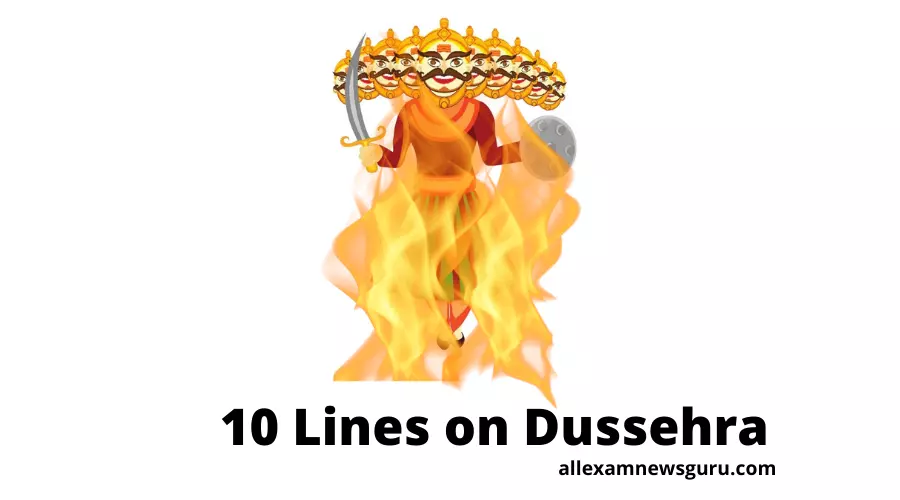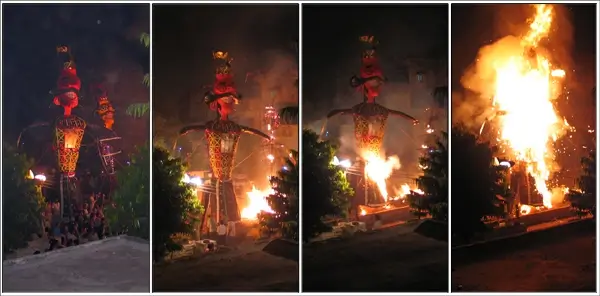If you are looking for an essay on Dussehra or 10 lines on Dussehra, then you are at the right post. Dussehra is a major Hindu festival celebrated with great enthusiasm and fervor in India. It marks the victory of good over evil and is also known as Vijayadashami. The festival is celebrated with various traditional rituals and customs, including the burning of effigies of the demon king Ravana. The significance of Navratri, the nine-day festival leading up to Dussehra, lies in the worship of the goddess Durga and her various forms. Each day of Navratri is dedicated to a different form of the goddess, symbolizing the triumph of good over evil and the restoration of dharma. The festival also holds cultural and social significance, bringing communities together to celebrate and participate in various festivities.
On the 10th day of the Navaratri festival, there is a festival in honour of Goddess Durga in the form of Goddess Vijaya. This festival is celebrated due to the slaying of Mahishasura.
Also, this day marks the victory of Lord Rama over the demon king Ravana.
This day is also celebrated as Dussehra in some parts of the country.
The word Dussehra means “the victory of good over evil.”
10 lines on Dussehra
- Dussehra is celebrated across India during September and October.
- It is the festival of triumph of good over evil.
- The word Dussehra combines two Sanskrit words Dasha and Hara, which mean ten and lord, respectively. It is a celebration of the victory of Lord Rama over the demon king Ravana.
- The festival is also known by the name Vijayadashmi.
- It is celebrated on the 10th day of Ashvin month and marks the last day of Navratri.
- This festival is celebrated in memory of the victory attained by Lord Rama over evil.
- On this day, special pooja rituals are carried out in temples across India.
- Many people also observe fast on this day.
- It is believed that on this day, Lord Rama defeated the demon king Ravana.
- On this day, the effigies of Ravana and his brother Kumbhakarna are burnt, and people take out processions with the effigies.
Short Essay on Dussehra
Dussehra is an important and widely celebrated Hindu festival. It is observed on the 10th day of the bright fortnight of the Hindu month of Ashwin, the month in which the holy book of the Hindus, the Vedas, was recovered from the demons by Lord Rama.
Dussehra is one of the most popular festivals in India. Dussehra is celebrated throughout India with great zeal and enthusiasm.
The name of the festival varies by region, reflecting local traditions and local languages. In the eastern and northeastern states of India and Nepal, the festival is called Durga Puja, while in the southern states, it is called Dussehra.
In the northern and western states, the festival is called Dashain. According to Indian mythology, Ravan, the King of Lanka, kidnapped Sita, the wife of Lord Ram, and exiled her to Lanka.
The story of Ramayan says that Lord Ram and his brother Lakshman went to Lanka and fought the battle with Ravan and defeated him and freed Sita.
The day of Dussehra is also celebrated as the day on which Lord Ram defeated Ravan. On this day, the effigies of Ravana with his 10 heads are burnt, and people take out processions with the effigies.
This is a festival that marks the win of good over evil.
- Essay on Sharks For Students & Children - April 8, 2024
- Essay on Cats for Students (+PDF) - November 4, 2023
- Essay on Carpenter|10 Lines on Carpenter - November 4, 2023


